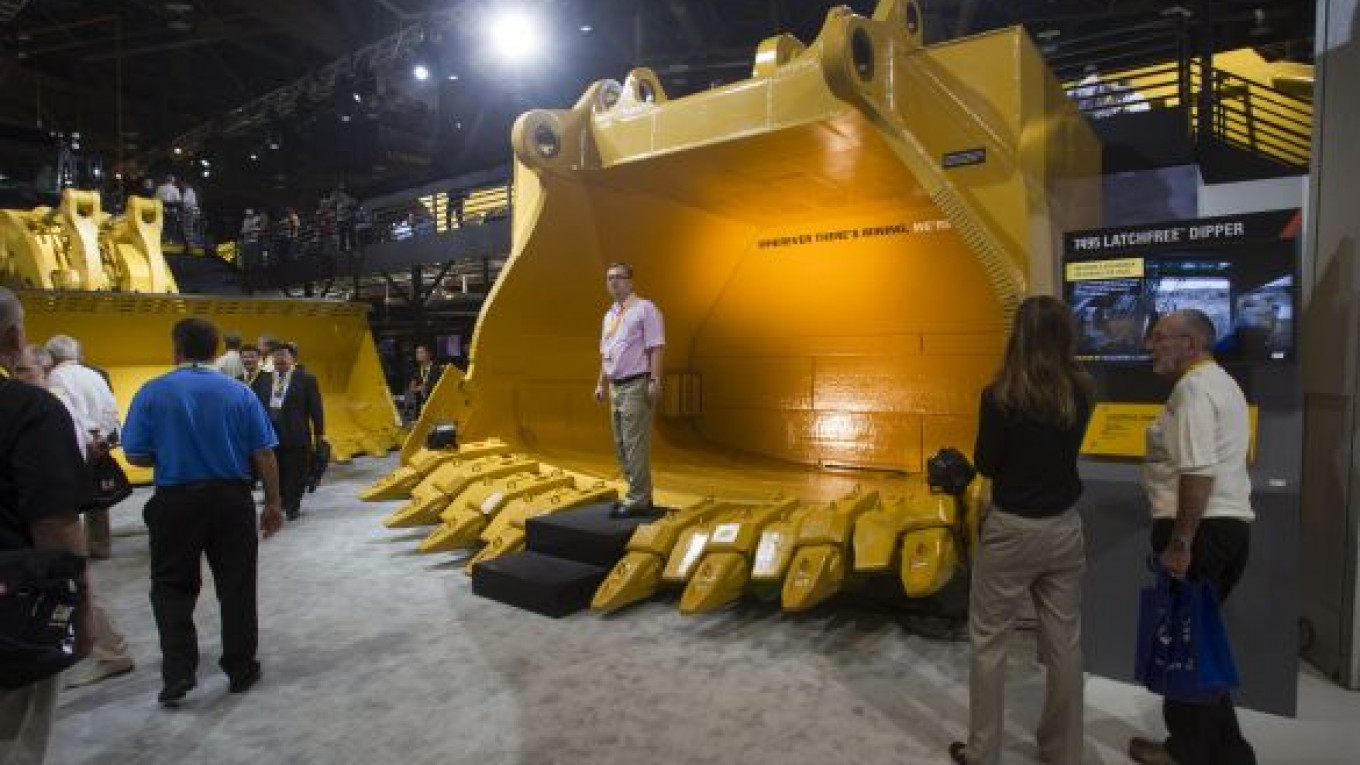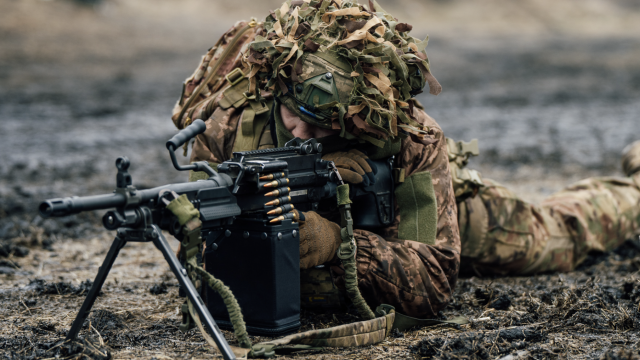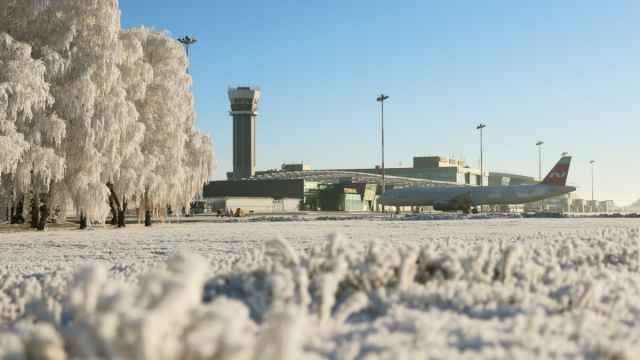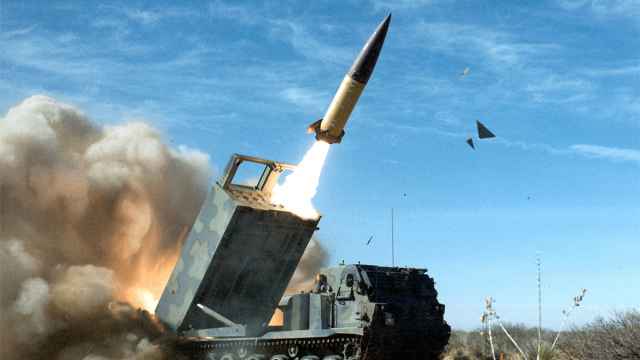NEW YORK — At a time when tepid growth at home, a slowing Chinese economy and recession in much of Western Europe is dogging Corporate America, Russia is getting newfound attention as a growth market for U.S. machinery, consumer goods and services.
Russia, a World Trade Organization member since August, accounts for only about 1 percent of total U.S. trade, compared to China's 12 percent. But in recent years, Russia has ramped up infrastructure spending and a growing middle class has snapped up consumer goods from soda to chicken to computer software.
U.S. exports to Russia were up about 29 percent in the first eight months this year from a year ago, and are forecast to top $10 billion in 2012, up fivefold from a decade ago.
Expecting increased Russian demand following its WTO entry, International Paper, Caterpillar, Deere & Co and others are stepping up investment in the country by expanding distribution networks, boosting capacity, or making acquisitions.
"Basically, we can sell all we can make in Russia," said John Faraci, chief executive of International Paper, which is developing a new paper machine for Russia and investing more than $1.2 billion to modernize plants there, including one in Bratsk, Siberia that will export to China.
Moves like these show companies are once again willing to place bets on Russia, a country known by business leaders as much for Kremlin-orchestrated corporate takeovers and corruption as for its natural resources wealth. The Russia moves also come as major U.S. companies have been growing less optimistic about the Chinese market — home improvement chain Home Depot recently decided to close all of its big box stores in China.
"Endemic corruption, vested interests opposed to change, intrusive bureaucracy and unreliable rule of law are all well-known barriers to investment and growth," analysts at Troika Dialog warned in an August report. But the investment bank nonetheless sees WTO membership boosting Russia's consumer, service and construction sectors.
Some multinationals remain cautious. Warehouse owner Prologis, which gave up lucrative opportunities when it pulled out of Russia in 2005, citing legal concerns, has yet to return.
"Prologis has no plans to enter Russia," spokesman Atle Erlingsson said.
Others are enthusiastic about the market's potential. Caterpillar, which last year expanded capacity at a plant near St. Petersburg that makes excavators and other mining equipment, has exported $2 billion of goods to Russia over the last five years and has added to its dealer network in the country.
Caterpillar CEO Doug Oberhelman says Russia could become the company's No. 1 export market, from about 10th place now.
Russia ranks ahead of China as a buyer of U.S.-made construction equipment, according to the Association of Equipment Manufacturers, buying $405 million worth in the first half of 2012, up 27 percent from a year ago, compared to China's $390 million.
Deere, the world's largest farm equipment maker, has expanded two plants in Russia that rely on U.S.-sourced components, and invested $70 million in an Iowa plant that makes large tractors, in part because of the potential for exports to Russia.
Agco, another farm-machinery maker, last year paid $928 million for GSI, the largest maker of grain storage systems, in part to target the Russian market.
"We view the WTO move as something that opens the doors for AGCO," said Eric Raby, the company's vice president of global marketing and commercial development.
Consumers and Beyond
Akron-based plastics and resins supplier A Schulman offers a glimpse into a multinational's Russia strategy.
The company generates around two-thirds of sales and profits in Europe and the Middle East. It currently exports from Germany, Belgium and Sweden into Russia — a market it expects to generate 10 percent of its Europe, Middle East and Africa sales within a decade, from less than 5 percent now.
Schulman supplies customers like Procter & Gamble, Volkswagen, Audi and Bosch in Russia. Auto and electronics markets are the next growth area because manufacturing of perishable consumer goods is already well established, said Bernard Rzepka, responsible for Schulman's European operations.
Schulman recently named two distributors in Russia and is looking for potential joint ventures.
"We need to have a plant there, so we're looking for (joint venture) opportunities," Rzepka said.
Others also see strong business prospects in Russia.
General Electric trumpets the commercial opportunities for its jet engines, locomotives, gas turbines and medical diagnostic equipment. The No. 1 U.S. conglomerate, the largest supplier of foreign aircraft engines to Russia and the largest aircraft lessor, sees aerospace tariffs dropping by more than half in Russia as trade ties increase. This should support jobs in aerospace manufacturing centers in Ohio, Vermont, Kentucky, and North Carolina.
Boeing, meanwhile, predicts Russia and neighboring states will take delivery of 1,140 new airplanes over the next 20 years, valued at $130 billion.
A Big Hurdle
The Russia ambitions of U.S. companies still face a barrier in Jackson-Vanik, a Cold War-era law that restricted U.S. imports of Russian goods because of human rights concerns. For years, American presidents waived the restrictions temporarily, but now that Russia has joined the WTO, the law violates WTO rules.
Deere, Boeing, Coca-Cola, Caterpillar and others are urging U.S. lawmakers to repeal the law after the U.S. election and establish permanent normal trade relations, or PTNR, with Russia — a necessary step for U.S. exporters to enjoy the same reduced tariffs under the WTO as their Asian and European rivals.
For example, tariffs on farm equipment imports will drop to 5 percent, from 15 percent, under the WTO — but Russia could withhold those lower tariffs from U.S. goods, Deere has warned.
Establishing PNTR with Russia also would ensure the United States has an avenue to challenge protectionist measures, such as recent environmental fees on car parts that could extend to other transport equipment, said Ed Verona, who heads the U.S.-Russia Business Council.
Congress is expected to enact a law normalizing trade relations with Russia by the spring, but it is not a done deal.
Lawmakers will hear from trade unions, food producers and small, private manufacturers. They are among those supporting a group that objects to normalized trade relations with a state-directed economy and points to a flood of imports from China, a PNTR partner for more than a decade. Russian exports to the United States include oil, steel and metal components, but generally not high-value manufactured goods.
"We've had a worsening trade deficit despite (being) promised otherwise with a series of multilateral or bilateral agreements," said Michael Stumo, CEO of the Coalition for a Prosperous America, a group pushing U.S. trade reform. Overall U.S. exports to Russia could double to about $19 billion a year if PNTR is passed, says the Business Roundtable, which argues that the U.S. is falling behind other exporters, especially European ones.
More sales for a company like Caterpillar are a good thing, Stumo said, "but that's different than the country's interest."
While President Barack Obama supports passing the PNTR bill on its merits, some Republicans would tie PNTR to measures punishing Russia for human rights violations. Russia has faced criticism for its treatment of opposition leaders and the long jail sentences handed down to businessman Mikhail Khodorkovsky and members of punk band Pussy Riot over an anti-Putin protest.
Those who favor PNTR legislation, such as Deere CEO Samuel Allen, consider it a matter of leveling the playing field and warn that Russia could exclude U.S. goods from lower tariffs.
"PNTR benefits the United States, not Russia," said David Thomas, a Business Roundtable vice president.
Related articles:
A Message from The Moscow Times:
Dear readers,
We are facing unprecedented challenges. Russia's Prosecutor General's Office has designated The Moscow Times as an "undesirable" organization, criminalizing our work and putting our staff at risk of prosecution. This follows our earlier unjust labeling as a "foreign agent."
These actions are direct attempts to silence independent journalism in Russia. The authorities claim our work "discredits the decisions of the Russian leadership." We see things differently: we strive to provide accurate, unbiased reporting on Russia.
We, the journalists of The Moscow Times, refuse to be silenced. But to continue our work, we need your help.
Your support, no matter how small, makes a world of difference. If you can, please support us monthly starting from just $2. It's quick to set up, and every contribution makes a significant impact.
By supporting The Moscow Times, you're defending open, independent journalism in the face of repression. Thank you for standing with us.
Remind me later.






